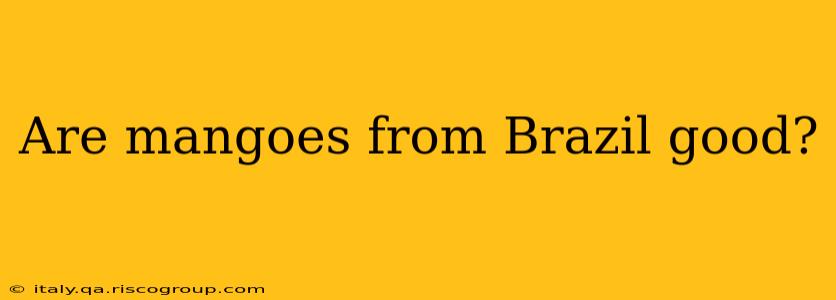Brazil boasts a vibrant and diverse agricultural landscape, and its mangoes are no exception. But are Brazilian mangoes good? The answer, as with most agricultural products, is nuanced and depends on several factors. This article delves into the quality of Brazilian mangoes, exploring their varieties, growing conditions, and overall reputation in the global market.
The Diversity of Brazilian Mangoes
Brazil isn't known for a single "Brazilian mango," but rather a rich tapestry of varieties, each with its unique characteristics. The country's diverse climate and geography allow for the cultivation of numerous mango cultivars, contributing to a wide range of flavors, textures, and sizes. Some popular varieties include:
- Tommy Atkins: A widely cultivated variety known for its large size, firm flesh, and sweet-tart flavor. This is a common export variety, often found in international markets.
- Haden: Another popular export variety, Haden mangoes are characterized by their fibrous, juicy flesh and intensely sweet flavor.
- Kent: This variety is prized for its excellent flavor and high fiber content. It’s known for its relatively long shelf life.
- Palmer: A smaller mango with a rich, aromatic flavor and soft, buttery texture. This is often preferred for fresh consumption.
- Keitt: A late-season variety known for its large size and exceptionally sweet, juicy flesh. Its thick skin allows for longer transport and storage.
Factors Affecting Mango Quality
Several factors influence the quality of Brazilian mangoes:
- Growing Conditions: Climate plays a significant role. Regions with sufficient sunlight, rainfall, and well-drained soil will produce higher-quality mangoes with superior flavor and texture. Brazilian mango farms located in ideal regions consistently produce top-tier fruit.
- Farming Practices: Sustainable farming practices, including proper fertilization and pest management, directly impact the quality, safety, and flavor profile of the mangoes. Organic mangoes, in particular, are gaining popularity due to their superior taste and commitment to environmental sustainability.
- Harvesting and Handling: Careful harvesting and post-harvest handling are crucial in preserving the quality of mangoes. Proper handling prevents bruising and reduces the risk of spoilage during transportation and storage.
- Variety Selection: The specific variety itself significantly influences the taste and texture, as highlighted above.
Brazilian Mangoes on the Global Market
Brazilian mangoes have established a strong presence in the international market. Their consistent availability, diverse varieties, and relatively competitive pricing make them a popular choice for importers and consumers alike. However, the quality can vary depending on the factors mentioned earlier.
Conclusion: Are Brazilian Mangoes Good?
Yes, Brazilian mangoes can be exceptionally good. Their quality hinges on several interrelated factors, including the variety, growing conditions, and handling procedures. While you might find some inconsistencies depending on the source and the specific variety, many Brazilian mangoes offer an excellent balance of flavor, texture, and sweetness. Consumers can ensure they receive high-quality fruit by choosing mangoes from reputable sources that emphasize sustainable farming practices and careful post-harvest management. Exploring different varieties will also lead to discovering personal preferences within the rich spectrum of Brazilian mangoes.

